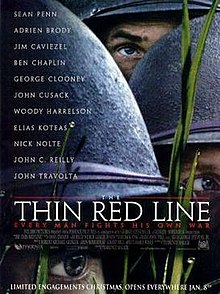
Back The Thin Red Line (cinta de 1998) AN الخط الأحمر الرفيع (فيلم) Arabic الخط الاحمر الرفيع ARZ İncə qırmızı xətt (film, 1998) Azerbaijani Тонкая чырвоная лінія (фільм, 1998) Byelorussian Тънка червена линия Bulgarian Tanka crvena linija BS The Thin Red Line Catalan The Thin Red Line Corsican Tenká červená linie Czech
| The Thin Red Line | |
|---|---|
 Theatrical release poster | |
| Directed by | Terrence Malick |
| Screenplay by | Terrence Malick |
| Based on | The Thin Red Line by James Jones |
| Produced by |
|
| Starring | |
| Cinematography | John Toll |
| Edited by | |
| Music by | Hans Zimmer |
Production companies |
|
| Distributed by | 20th Century Fox |
Release date |
|
Running time | 171 minutes[1] |
| Country | United States |
| Language |
|
| Budget | $52 million[2] |
| Box office | $98.1 million[2] |
The Thin Red Line is a 1998 American epic war film written and directed by Terrence Malick. It is the second film adaptation of the 1962 novel by James Jones, following the 1964 film. Telling a fictionalized version of the Battle of Mount Austen, which was part of the Guadalcanal Campaign in the Pacific Theater of the Second World War, it portrays U.S. soldiers of C Company, 1st Battalion, 27th Infantry Regiment, 25th Infantry Division, played by Sean Penn, Jim Caviezel, Nick Nolte, Elias Koteas, and Ben Chaplin. The novel's title alludes to a line from Rudyard Kipling's poem "Tommy", from Barrack-Room Ballads, in which he calls Scottish foot soldiers "the thin red line of heroes",[3] referring to the stand of the 93rd Regiment in the Battle of Balaclava of the Crimean War.
The film marked Malick's return to filmmaking after a 20-year absence. It co-stars Adrien Brody, George Clooney, John Cusack, Woody Harrelson, Jared Leto, John C. Reilly, and John Travolta. Reportedly, the first assembled cut took seven months to edit and ran five hours. By the final cut, footage of performances by Bill Pullman, Lukas Haas, and Mickey Rourke had been removed (one of Rourke's scenes was included in the special features outtakes of the Criterion Blu-ray and DVD release). The film was scored by Hans Zimmer and shot by John Toll. Principal photography took place in Queensland, Australia and in the Solomon Islands.
20th Century Fox released The Thin Red Line on December 25, 1998 and grossed $98 million against a $52 million budget. Critics gave it a positive reception, praising it for its philosophical depiction of war, Malick's direction, musical score, cinematography, screenplay, editing, and performances of the cast. The film was nominated for seven Academy Awards: Best Picture, Best Director, Best Adapted Screenplay, Best Cinematography, Best Film Editing, Best Original Score, and Best Sound. It won the Golden Bear at the 1999 Berlin International Film Festival. Martin Scorsese ranked it as his second-favorite film of the 1990s. On At the Movies, Gene Siskel called it "the greatest contemporary war film I've seen."
- ^ "The Thin Red Line (15]". British Board of Film Classification. January 29, 1999. Archived from the original on October 11, 2016. Retrieved October 11, 2022.
- ^ a b Cite error: The named reference
mojowas invoked but never defined (see the help page). - ^ " Rudyard Kipling -- Tommy Archived April 1, 2012, at the Wayback Machine. Web Books. Retrieved 2001-08-04.